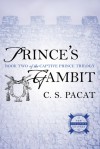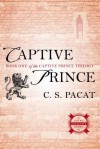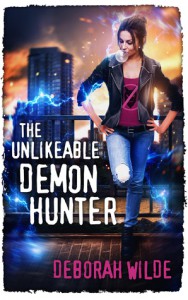The State of Booklikes?
It's been a while -- years solidly at this point -- that I've been well and truly engaged around here. So long that it really only occurred to me sometime last month, when I was reloading the page for the umpteenth time, not sure I was going to get the stupid cloudflare whatsit again, or my BL feed, which would end two posts in in a spinning wheel, that this site is on its last legs? It wouldn't surprise me for a minute if I were to try to log on anytime in the future and just get 404'd, and that would be that. Exit BookLikes.
It's bummer, certainly. I do enjoy dipping into the bookish chatter -- muted though it is recently -- and I like having the feeling of this community around me. I imagine the disbursal is largely underway at this point, given the technological jankiness, and that's always a melancholy period.
More selfishly, I like having a record of the books I've read in the last seven years or so. I've always been shit for titles, and I also read a lot of interchangeable pulp before bed. The titles aren't memorable for these books, nor is anything else. There are times when I legitimately can't tell if I've read the book before based on title or description. Being able to rifle through the old BL bookshelves saved me from getting 70 pages in, exclaiming "wait just a minute here", and then having to find a new book to read on multiple occasions.
Is anyone aware, short of copy-pasta, how to download one's bookshelf from BL? I'm not even invested in my reviews at this point -- they're largely tossed off when the mood strikes every 4-6 months -- I just want the list of books I've read. (Legit: I should just start a google doc at this point, or, heaven help me, a notebook with paper.) I would really appreciate any help in this matter.
I would also like to acknowledge that popping in after years of sporadic activity, observing the ill health of the website one is on, and then asking for help might be construed as a total dick move. Please don't take this as a swan song or a flounce. I intend to keep stopping in, logging my reading, and catching up on reviews like I have for the last years. You all are pretty great, and I've always liked the vibe around here.
 3
3
 3
3
Mid-series thoughts
Man, gotta say, this series reminds me very strongly of Kushiel's Dart:
- Elegantly written
- Packed with court intrigue
- In a high fantasy setting that
- is at least partially modeled on Renaissance Venice
And also:
- Packed with sexualized violence and sexual violence
- That often rides the line of what I, personally, am willing to tolerate in fiction
- And for sure is over line for many readers
- Though I don't get the impression either writer is being prurient or provocative for its own sake.
Weirdly, it was when the main relationship -- one between the titular captive prince and his captor -- shifted to a dynamic of more equitable standing that I kind of freaked out and had to stop reading at about 90% of the way through the middle book in the series. Still not sure what that was about, though I suspect that I freaked because their previous relationship -- one that was, in a word, abusive -- had been so normalized in the text that the shift made that abuse obvious. I'd been Stockholm syndrome'd along with the captive prince.
This isn't maybe the most interesting thing to do -- just observe how many people treat Humbert Humbert like some kind of romantic hero, and his relationship with Lolita as a grand love story, and you can see how easily readers will dupe themselves into siding with abusers. What's interesting is unmasking it for what it was, and then trying to move on from there.
So. Onto book three, I guess.
 1
1
 4
4
Smeyer wrote a spy thriller! Who knew? Not me.

Recently, a friend brought to my attention an article about Chris Paolini’s upcoming foray into science fiction space opera — which is code-named “TSiaSoS” ( or “The Something in a Something of Something”) — so that we could be assholes about it. I’ve said this before, but: I actively enjoyed Eragon as a sort of gleeful homage slash Frankenstein’s monster of formative fantasy literature. There’s lots of Tolkien, some Dragonflight by McCaffrey, even some elements of Star Wars (which is totally science fantasy; don’t @ me.) But the later books in the series just get worse and worse as he begins to believe his own hype. I couldn’t even make it to book four because three was such an interminable Mordorian slog. Anyway, one of my friends pointed out that it’s been nine long years since Paolini last published a novel — though there was a collection of short fiction — and that historically writers known for one thing trying to cross over into another genre after a long publishing lacuna tend to fare poorly. “Remember Stephenie Meyer’s spy thriller?” He asked.
I was like, record scratch what the fuck, no I hadn’t.
Turns out, in 2016, Meyer published a novel called The Chemist. It had been eight years since both The Host and Breaking Dawn were published. I can only speculate about how well The Chemist did: The article about a screen adaption says it sold 1 million copies, which is a whole fucktonne of books. But the article also mentions that the Twilight Saga sold 100 million copies, which is literally two orders of magnitude more (pop pop!). The Host, published concurrent with Breaking Dawn, which includes an alien parasite love triangle (square, really) sold something like 6.5 million copies. So The Chemist is no kind of dismal failure, but it also hasn’t enjoyed anything like the sales of either Twilight or Twilight‘s not as successful followup. And it’s being worked for a screen adaption.
Long story short: I had to read it.
Juliana/Alex used to work for an evil government agency which is so evil it doesn’t even have a name, but which is CIA-adjacent. She worked as a torturer, wringing confessions and information out of people using pharmaceuticals: inject something to cause agonizing pain, and then question them after the effects wear off. Something like three years before the start of the novel, the department decided to liquidate Alex and her mentor, and she’s been on the run ever since. The department catches up with her; they say they want her to come in from the cold; due to a series of bad choices she ends up kidnapping and torturing a DC school teacher. Mid-torture session, his twin brother literally parachutes in with his attack dog. After a squabble which gives Alex the upper hand, she and the twin brother come to the realization that they have been set up to kill each other, because they are both loose ends.
On a sentence level, Meyer has decidedly improved as a writer. There isn’t the same embarrassment of adverbs or awkward phrasings. Her writing has smoothed into the kind of prose that you don’t notice while you’re reading, which I think is appropriate for this sort of hacky popular fiction. (I know I’m treading dangerously close to the aphorism “If you like this sort of thing, then this will be the sort of thing you like”, but I don’t mean this observation about prose style to be some sort of snide aside. One thing I appreciate about Meyer is that she seems earnestly dedicated to the craft.) Meyer has always been better at detailing the interpersonal than she has been at action sequences, and that still holds in The Chemist. As a spy thriller, which lives and dies by its action sequences, this is something of a problem. The only action sequence I thought worked was the one with the dogs at the ranch house, and then only in places. Otherwise, the pacing is almost always off, as Meyer lingers on details that aren’t important, while hand-waving things that, on a tactile, physical level make no sense.
For example: While Alex is busy torturing the schoolteacher, she hears a plane buzz overhead and then crash in the distance. This is after a truly interminable sequence wherein she roofies and then abducts said schoolteacher from DC out into, like, the Pennsylvania wilderness or somesuch. I can’t stress enough how long the abduction sequence was, even though it was probably only pages. When evil twin brother appears, he has a preternaturally trained attack dog with him. He explains that he had to bail out of the plane and let it crash because there was no nearby landing strip, and he needed to get to his bro toot sweet. So, real talk, how did the dog get out of the plane with him? Did the dog have a dog parachute, with a ripcord it pulled like one of the Golden Plump chickens in those weird commercials in the 80s? Or did he have a Dog Bjorn so that a 80 lb German shepherd was somehow affixed to his body? How much weight can the average parachute handle? Given that evil twin is an absolute unit of a guy, over 6 feet tall, add a bigass dog, just, is this even physically possible? Even the most plausible answers are silly as hell. This is bad writing.
But I really want to go back and examine Alex’s background as a torturer. She does a tiny little bit of hand-wringing about her torture talents when she discovers that she’s tortured an innocent man. Like, that has never happened before zomg? Heretofore, all of the subjects she’s tortured (for a shadowy government agency that has spent three years trying to murder her after successfully liquidating her mentor while at work) have been absolute, easily discernible bad guys. (Sure, Jan.) Moreover, she has a 100% success rate in getting them to divulge meaningful intel through her pharmaceutical torture. She regularly leans in to the fact that her torture methods — which are pharmacological — do not leave marks, which is so much more civilized that lopping off toes or whatever. Apparently it doesn’t count as torture if you don’t leave marks.
Absolutely all of this grade A red state hogwash. Torture is torture is torture.
Subjecting detained people to pain is immoral, whether you leave marks or not. It is evil to torture people. Torture violates both domestic law and the Geneva Convention. Waterboarding doesn’t leave a mark. The mob knew ages ago how not to leave bruises — a phone book or a bag or oranges will do the trick. And it’s been absolutely fastidiously documented that torture doesn’t result in meaningful intelligence: people will literally say anything to make the pain stop. That Alex uses chemicals to perpetrate pain on her subjects does not absolve her of this evil. I feel like I do when I encounter anti-vaxxers: not only do vaccines not cause autism, but even if they did, there is nothing fucking wrong with autistic people; stop acting like autism is worse than death. Torture will not give you meaningful intel, but even if it did, it’s still a grave and mortal sin; stop acting like torture can be excused.
It’s completely wild to read a book with a main character who engages in actual, legit war crimes, doesn’t feel bad about this, and is treated like a sympathetic character. She even has a stilted, embarrassing romance with the innocent man she tortured, because why the fuck not? He begins excusing her treatment of him while still tied naked to a steel slab, mid-rescue by his brother. She didn’t mean to torture me lol, it was just an honest mistake! What a meet-cute! Just, blah, I don’t even know how to deal with this.
So. I’m here at the wrapping up stage of this here book report, and I’m not sure where to go with this. I’ve often felt fondly toward Stephenie Meyer because I can appreciate the way she writes from her hind-brain in the Twilight Saga: Yes, of course, all of that imprinting business is bananas and the religious overlay completely twisted, but it felt honestly, individually fucked up in a way that occasionally resonated. I’ve said this before, but the birthing sequence in Breaking Dawn is the most horrifically bonkers thing I’ve read about childbirth, and I have a stunned admiration for what it must have taken to put that to paper. Sweet Jesus, woman, yikes.
Meyer, in The Chemist, is writing in a genre she has real affection for, but it doesn’t tap her subcutaneous instincts, which are, for better or for worse, her greatest strengths as a writer. The Chemist doesn’t feel like a hind-brain fiction; it feels calculated and planned. It is ultimately a bloodless iteration of bloody events. Meyer even lampshades this in the beginning, when Alex goes to the library to check out slash steal pop fiction spy thriller books. Yes, it’s all fictional, the torturer heroine thinks, but maybe there’s something clever I can learn. This is clumsy metafiction: hey I’m writing a book that acknowledges the books used as antecedent. But ultimately Meyer doesn’t have any skin in the game — not like she did in the Twilight Saga anyway — and it shows. She may have improved her prose, but she hasn’t improved her writing.
 1
1
 2
2
 5
5
History and Historical Romance

I tend to get all breathless and twitterpated when I discover a new historical romance writer I enjoy, sending out profligate hold requests at the library. That was the case with Julie Anne Long, whose Lady Derring Takes a Lover was so beautifully choleric on the ingrained sexism of the time, and features a found family plot and exquisitely rendered female relationships. I maybe don't need to say this, but I will anyway: as much I enjoy a historical, the baked in acceptance of social norms which are, to put mildly, antique, and to put more specifically, fucked beyond the telling of it, makes me often quite itchy while I read.
This is figleafed in ur average historical romance: industrialists are all, to a man, fair minded and generous, having acquired their fortunes without being the rapacious monsters they all, to a man, were. The aristocrats -- the dukes and earls and the like -- may have daddy issues, struggling under the injurious regard of their Old Testament fathers, but these paternal and paternalistic dinosaurs are emblematic of a outdated mode of lording over great swaths of land and hundreds, maybe thousands of people. These new sons are embodiments of a New Aristocracy, one that views its marriages as meritocracies, the perfect embodiment of noblesse oblige.
I was just reading one recently where the industrialist romantic lead mentioned offhand his ownership of cotton mills, and my mind leapt right to tour of Lowell, MA I took some years ago. Lowell is a locus of both early American industrialization, and the inevitable labor movements that follow once people grow weary of being ground down by engines, spitted by the spearpoint of progress. Young women, girls really, worked 12 hour days six days a week until they coughed themselves into an early grave due to the cotton fibers they inhaled, the factory air muzzy with a fog of particulates. (It is also the hometown of Jack Kerouac.) That's the problem with historicals: they are inescapably based on history, which features a boot on a throat in one permutation or another for as far back as one can manage.
So, the endgame of this little diatribe was some dissatisfaction with It Started With a Scandal. On every objective metric, this is a fine novel, with excellent characterization, smooth pacing, and well drawn sexual tension. Long is a smart, interesting writer, and I will continue to read the shit out of her back catalog. However, I was never quite able to get over the fact that our romantic lead was a prince of Burgundy or Bourbon or somesuch, a French aristocrat who fled France during the Revolution. He's very put out by the fact that his ancestral lands are not in his family's possession anymore, and spends much time glowering and throwing vases in fits of pique. The leading lady, his housekeeper, vouchsafes to feel bad for him quite prodigiously. She is herself just weeks from penury -- she and her child -- so she knows what it is to lose things.
To which I say: bah. The French aristocracy deserved to have their heads separated from their necks. They were indolent, greedy, dissolute shits whose venality resulted in the abject poverty and misery of hundreds of thousands, maybe millions of people. So boo fucking hoo about getting run out of the country where our hero was born into incredible wealth and privilege. (I may have my back up after seeing some billionaire -- there are only 600 or so in America, a listable group of people -- literally crying on television because someone might tax him commensurate with his wealth. Meanwhile millions of Americans go bankrupt or just fucking die due to a medical insurance system designed to maximize profits at a brutal human cost. Fuck, and I can't stress this enough, every single billionaire.)
I am aware of, and engage in quite happily, the sort of historical blindness required to enjoy a historical romance. I am not going to nitpick inconsistencies unless they are egregious and/or not in service of the final resolution. But sometimes I'm in my own place in history, where I cannot unsee the parallels to current, ongoing, often fatal injustices in the world. I am not going to waste time feeling bad for people who have had everything and then some given to them by accident or birth who, just occasionally, feel thwarted in their every impulse. Our heroine's soft-heartedness looks soft-headed.
I've said this before, but I'm going to repeat it: every romance has the echoes of a less satisfactory conclusion embedded within it. Without the invisible authorial hand, our housekeeper's life would end in brutal poverty, discarded by a "polite" society predicated on systematic exploitation. Mostly I'm satisfied with these romantic revisions -- that is the point of a historical romance novel, n'est-ce pas? I can and do acknowledge this freakout is largely on me -- I do not want to enbussen Long, who seems a very fine writer, because of a personal convergence of things. But sometimes I just can't. The romantic conclusion ends up seeming such a petty, priapic thing, the tumescence of love blotting out all impediments to our lovers, even the important, necessary, and structural ones.
Probably I should just back way from historical romance for the time being, library holds notwithstanding, until some improbable time when our brutal history is less brutal. I'll be busy holding my breath.
Would you like to read my AU?
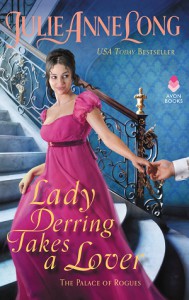
Lady Derring Takes a Lover has such an unbelievably jaundiced view of the relationship between men and women -- and between the classes -- and I am 100% here for it. The titular Lady Derring meets with her solicitor after her husband's death, only to discover he left her destitute. While she's learning of her abject penury, her husband's mistress sweeps in, and learns that she, too, will not inherit a dime. They've been ruined by the same man, because it is a rare situation where women's fortunes are their own. Lady Derring and the mistress, one Angelique Breedlove (not her birth name), pool their limited resources and set up a boarding house in a building that once was a brothel known as the Palace of Rogues.
The romantic lead doesn't appear except in snatches for a long, establishing opening -- this is the first in a series, so some groundwork must commence. Instead, in that interregnum, we are given a beautiful nuanced relationship between a widow and a mistress, one with so much heat I could see some furious slash written about these characters. Romantic lead dude is fine -- his major superpower is that he godamn listens -- but those women, gah, so hot. Which I guess tells you plenty about my predilections, you're welcome.
Shared World Novels what what

This was an odd little experiment, which I undertook because I'm so on the hook for Nalini Singh's Psy-Changeling novels, but then I haven't been down for much else she's written. I'm not sure what the official name for this series is -- Lords of [Something] would be my guess -- but it's four different paranormal romance novels with an overarching plot written by four different writers. I find this sort of thing fascinating -- when novel writers collaborate like television or comic writers.
The last series like this I read was the Crimson City novels. Most of them are by someone called Liz Maverick (which is surely not a pen name at all), but the second is by Marjorie M Liu. who, before she racked up all the awards for Monstress, wrote this fucking brilliantly weird PNR series called Dirk & Steele. I mean, she really moved the markers for what you can pull off in the sometimes boring vampire/werewolf snorefest you can find in the genre. Liu took the kind of premise that made me exclaim, wait, what?? like a hundred times when I was reading the first novel, Crimson City, and in her story, grounds it so completely in believable interpersonal concerns that my brain stopped screaming every 15 minutes about how nothing about the world made any sense. That's some godamn writing right there.
Singh's outing in the Lords of [Something] maybe wasn't at this level, but I actually made it all the way through to the end of the novel, which is something I cannot say about the other three books in the series. Some of this is just the silliness of the premise, because all of the books are riffs on various fairy tales. There's one based on Goldilocks and the Three Bears, for example, where our fair haired maiden finds a rock hard cock which was just right, and I just couldn't stop my brain from squealing immaturely, and then breaking into laughter.
Lord of the Abyss is very loosely based on Beauty and the Beast, and it works in the places that Singh tends to excel, and otherwise is kind of a mess. She does an excellent job writing characters out of trauma and abuse. She doesn't go for the magic vagina, the ladybits that can cure all, but constructs believable psychologies warped by neglect, and then slowly, carefully, draws them out. But the world, and the magic, is slapdash, so the parts of the plot that intersect with that are shaky at best.
So, fun to see a writer I tend to enjoy, at least in one limited context, pull off something in a shared world. Didn't captivate me like Psy-Changeling, but it was a perfectly cromulent way to pass the time.
ETA: Ok, I actually looked, and the series is called Royal House of Shadows, which seems kind of stuffy and conceited, but what do I know.
More librarian help?

And it happened again! The author is A.J. Hackwith, not Amanda Hackwith. This is her first novel. How do I keep the author name from morphing into a similar sounding name when the database gets confused? Or is this just one of those bugs?
 6
6
Librarian help?
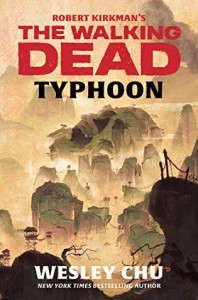
I have no idea who Dean Wesley Smith is, though he's listed as the author of this book for some obscure reason. The real author -- and this is in big letters on the cover -- is Wesley Chu, who wrote The Lives of Tao, among other things. Could someone fix this please?
Thx.
 2
2
Neverwhere Meets His Dark Materials with Bridget Jones as the Lead, but better than all that
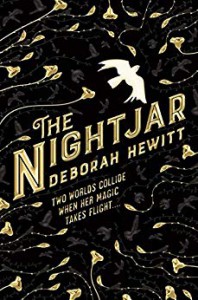
Uff da, that was one of the best debuts I've read in a while. It all feels very familiar in the beginning: The nightjars (a kind of bird more commonly known as nighthawks in the US) act as soul-bodies; this feels like Phillip Pullman's daemons (or Lauren Beukes' familiars, but I don't think as many people have read Zoo City.) Much of the action takes place in an alternate London known as the Rookery; there are so many alternate Londons that this listicle of ten has a half dozen comments pointing out several not on the list. The overt plot opens much like Neverwhere, with an office drone getting sucked out of her routine and submerged into a magic world (though The Nightjar's protagonist doesn't suck like Richard Meyhew.) I totally thought I knew where this all was going, but whoo baby does Hewitt deliver a series of brutal shocks in the end.
This is the interesting part: sometimes when writers deliver a twist, it's unearned in the narrative. Either they've been withholding information, or they're just being perverse, or they weren't good enough setting it up. (See, for example: Dany's burning of King's Landing, which was at least the latter two, if not all three.) Not so, Hewitt. She gives you all the information, but in such a way that the reader jumps to several erroneous conclusions. So when she puts you right in the end, it's no one's fault but your own for making an ass out of u and me. It's very, very well done.
Shills up and down my spine

So, I haven't read this yet, but Rockhead is by a friend of mine, Sean Toren. He moved in next door to me over a dozen years ago; his son and my child were born weeks apart and grew up together. When he learned I was a big book nerd, we talked at length about this nascent novel, which he'd been tinkering with for quite a while. It's very satisfying to learn it's going to be out in the world. Apparently it's had a favorable review in a rock climbing magazine and everything.
Anyway, when Sean first told me about his rock climbing novel, I was put in a funny spot. At the time, Mr Ceridwen was a huge baby about rock climbing and thought all climbers were douches. This went back to a traumatic experience with a college girlfriend and the climbing geeks she knew and kinda messed around with. Mr Ceridwen has since well gotten over it -- he even climbs with kid #2! -- but the incongruousness of how awesome Sean is compared to how much Mr Ceridwen hated climbing slash climbers made for some backyard comedy.
Anyway, so this is my non-review. If you like climbing maybe check it out. I don't think anyone has to cut off their arm, but you never know...
Librarian help?
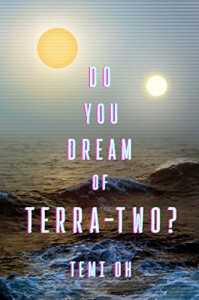
As happens when I try to add a book by a debut author, the stupid database picks another author name that's, like, kinda similar. Can someone fix this so the author's name is Temi Oh? Not Temi Matterhorn or whatever?
Thanks
 2
2
It Came from the Back Catalog!
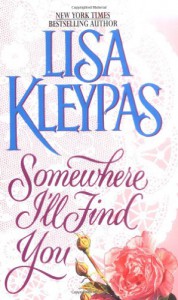
I've been very happily reading through Lisa Kleypas' catalog. The Wallflowers books are pretty great (other than the one with the St Sebastian dickhead) and I think the Ravenels don't have a bad volume, even if the first one is a little weak. But this is inevitable when reading backwards through someone's novels: you're going to hit a dud written 20 years ago when said novelist was just beginning to hone their craft. This is that dud.
I do not mind ridiculous set-ups in romance novels. In fact, I think building as ridiculous a set-up as possible and then getting the reader to buy it is one of those skills romance novelists share with mystery writers. It's a convention of the genre. But the ridiculous set-up in Somewhere I'll Find You repeatedly annoyed me: the children of two jerks are married to each other when he's seven and she's four. One needs money; the other wants his grandchildren to have a title. You know, typical Duke of Marlborough marries Vanderbilt stuff. It's the forced marriage trope, cool cool. But then several times the characters mention that clearly the marriage can't be legal, so why the front door is anyone worrying about it? When girlfriend comes of age, she changes her name and joins a traveling troupe of actors, because you're not going to tell me what to do, Dad!!! I'll just go hide from a marriage that isn't legally binding! She's all scared her husband will come find her because what if he's a dick like her dad, but I keep flow-charting back to the fact that everyone is behaving as though this sham marriage matters.
So ten years after she's told her dad to pound salt and taken off, main girl is like the most successful actress in London, acting opposite the theater owner and all around growling misanthrope in hot pants who should have been the lead. Everyone thinks they are making the beast with two backs, up to and including her husband, who comes looking for his wife in London so they can divorce and have their own lives, and instead finds this zesty and refreshing young actress. But then dun dun dun they are one in the same! What are the odds! And he loves her and think they should stay married! But she wants to continue her career! So they have some contrived conflict about it until events conspire to work out!
Bah, this is all too wonderful for me. I think I'm supposed to think there's fate at work here or something, but it all just seems dumb and awful. The romantic lead dude consistently blackmails, maneuvers, or otherwise ignores our heroine's wishes. He also does that thing that so many romantic leads do, which is just get overtaken with black jealousy maybe the second time he and lady friend hang out and she spends any attention on another man. I'm supposed to take this as a sign of his deep affection I guess, but it reads like controlling asshole to me every time. And when they do finally bone so he's sure he owns her now? That jealousy translates to a highhandedness that's both patronizing and paternalistic, which is a nice trick if you can pull it off.
Additionally, there is a subplot involving a slinky bitch-goddess mistress of the main guy who gets curbed when he finds his actress/wife. She then pulls a fake-pregnancy plot to try to entrap him into marriage while crawling all over the dude trying to lure him back with her luscious sexuality. The sexy mistress who flies into jealous rages after bro finds his virginal soulmate is a trope I could do without, and I do not appreciate the slut-shaming and compare/contrast between different sexual modes for women. Virginal mouse or luscious sexpot are not actually in conflict with one another. They could both exist quite happily in the world together if they weren't constantly set up as this ridiculous dialectic.
Anyway, I should emphasize that I generally like Kleypas, so this is an anomaly, something pulled from the back catalog when it probably should have just stayed in the dustbin of the 90s. I am also totally going to read the next in series too, because it's about the growly hot pants theater owner. He gives such charmingly jaundiced advice to our heroine in this novel, and ye gads do I love a cynic.
Holy cats

I think I expected this to be an extension of Uprooted, like maybe something 10 years down the road, or about some peripheral characters, or something, but that is not what this is at all. It's it's own thing, whole and true, something like a modern fairy tale, but one that fucks with the idea of both fairies and tales. Just a damn fine novel.
Go large or go home

This one was a real oddity to me, because it felt like that class of Gothic fiction that attempts to take things seriously -- like, the scholarship was spot on, as was the description of academic research, historical detail, and just general academic jockeying -- but then the serious tone slips to the soporific and everyone falls asleep. This book is crazy boring.
Gothic fiction tends to have a lot of blood and violence in it -- both metaphoric and literal. Wuthering Heights is a fucking bloodbath, an absolute hatecast where very few make it out alive. I mean, sure, Cathy and Heathcliff are terrible people, but hot damn are they fun to watch. If they weren't terrible people no one would care and there wouldn't be a story. High passions are the bloody engine; this is Romanticism run feral.
So when the writers of modern Gothics try to make everyone sensible and reasonable, I wonder what the point it. People have to be a little touched just to get the juices flowing. Stephenie Meyer, in New Moon, tried to make everyone a good person, which would have been boring, but it turns out her sense of what makes a person worthy is so completely bonkers that the book still kind of works as a Gothic. Edward, Bella, and Jacob are all terrible people, so the hatecast can work its Gothic magic.
But A Discovery of Witches? Yawn. The lead is the scion of two seriously important magical families, but won't use her magic because reasons that make almost no sense. She wants to succeed in academia on her "own merits," which, isn't magical ability one of her own merits? Anyway, I grew right tired of how helpless she was, and how she was simultaneously a big deal Chosen One type. Own your power, woman.
Her love interest is a fancy vampire tosser, and their courtship is spent talking about antiques. When they confessed their love for one another, I was like, did I miss something? You're in love with each other over that pile of boring? Which is not something I should ever be saying reading a Gothic; go large or go home.
Anyway, I don't want to put the knives in too hard. I think the exercise of trying to make rational grownup types enact genres that tend to fall more on the Romance end (by which I mean in the Nathanial Hawthorne sense, not like modern romance novels, exactly) is an interesting one, though I'm not sure I've ever seen one be successful. I'll have to think about it.
 6
6
 4
4
Fun Series Marred by Unrelenting Girl-Hate
CW: rape & slut-shaming
Though the Night Huntress series is pretty basic urban fantasy -- a half vampire lady stalks the streets at night to stake the undead threat -- there's enough little twists to keep it interesting. Our night huntress is the product of rape, and everything she knows about vampires come from her vampire-hating mother, which isn't much, or just plain trial and error. She meets up with a Master Vamp (named Bones ugh) after trying to stake him in a bar. After he disarms her with laughable ease, Bones proposes they team up to hunt vamps of his choosing, and he'll train her not to get killed. She thinks she's being real clever when she agrees to this while plotting to kill him at the end of the training period. Inevitably, they hook up. &c.
I sort of let this slide in the first book, but boy does Cat shit on other girls. But I thought, she's maybe 18, and has been raised by an embittered mother who tells her she looks just like her father, who is a rapist. Mom sends her out to get killed on the regular, using her as a revenge proxy. Her mother seems to punish her daughter for her father's sin, so it made psychological sense to me that a girl raised without much affection and as the product of rape would be all "slut" this and "whore" that. By the second book, though, there's a big time jump, Cat is adulting pretty well, and seems to understand her mother's deep failings as a parent while maintaining a relationship with clear boundaries.
And yet, the girl-hate only deepens, at times seeming to warp the behavior of many of the female characters. A variety of lady vamps from Cat's paramour's past show up through the novel, and they are all bombshells who spend their time crawling all over Bones or reminiscing about all the threesomes (or fivesomes!) they had with Bones back in the day. They are ridiculous misogynist caricatures, and not even relying on the more fun sexist tropes like Ice Queen or Hitchcock Blonde; they're just Slut Trash. Bones is not criticized for catting about in his youth, natch.
Cat's inner and outer monologue is basically WHORE BITCH DIE, and this is passed off as "vampire possessiveness." Which, no. From all evidence, vampires screw around a lot, and without a lot of regard for gender norms. If they were sexually possessive, they would not be leaping into big fuckpiles all the time. (Indeed, the vampire penchant for fuckpiling is used at least twice as a plot point.) The concept of "vampire possessiveness" is inserted into the text so Cat (and by extension, the reader) can feel ok with how much she hates other women. It does not come up, either in word or deed, at any other point in the plot.
Admittedly, Cat now has a woman friend on whom she does not shit, so not all of the female characters are treated this way. (And there's her mom, but that's obviously a whole other thing.) But it was a common enough element of the books that I began to sour on Cat. She regularly is required to dress up in "slut gear" (I think she calls it "slut gear") to lure male vamps to their deaths, so there's this weird acting out of the very thing she castigates other women for. Cat may look like all those other slutty sluts, but of course she is Not Like Other Girls™.
Cat is a fun character: a hard-drinking hard case who is way more naive that she pretends. What I've read of Frost's later books don't have this girl-hating element in them, so maybe it's just Cat, like girl-hating is just part of her personality or whatever. Maybe Frost isn't in control enough of her first person (yet, these are her first novels) to delineate the thoughts of the character from the parameters of the world. (That's the standard objection when a reader criticizes the actions of a character, anyway: that I can't tell the difference between what the character thinks and what the author does.)
However, given the stated behavior of the slutty sluts, which are objective acts and not subjective opinion, that is not the case: the world works like Cat says it does. Which is to say, most women are oversexed and duplicitous by nature, except for Mom and Designated BFF. Put another way, women are slutty sluts whether Cat calls them that or not; this characterization of women is baked into the world, not one character's worldview.
I just ... can we not? Can we not enact girl-hating and slut-shaming in girl pulp for girls? Don't we get enough of that hot garbage in real life? When I read escapism, I want to motherfucking escape. That gets hard when I keep running right into the same misogynist trash fire that is so vigorously burning in the world today. This is legitimately a fun series, but I just don't feel like pushing past the girl-hating at this point in time. Happy New Year!
 2
2



